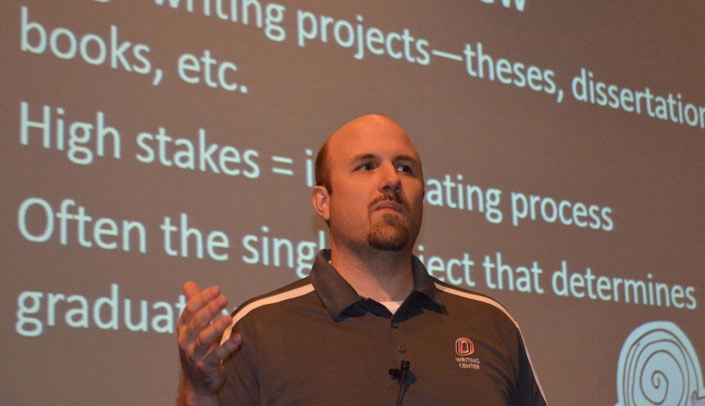G. Travis Adams, Ph.D., opened up his dissertation again about a week after submitting it.
Flipping through it, he found a note in brackets — to himself.
“Hey, summarize this,” Dr. Adams had written to himself — and then submitted and defended the dissertation, leaving the note in the text.
“Did I still get my degree?” he asked. “Absolutely.”
A big writing project can be intimidating, Dr. Adams told a room of 50 UNMC graduate students. An assistant professor in the department of English at the University of Nebraska at Omaha (UNO) and the director of the UNO Writing Center, Dr. Adams was speaking on “Approaching Big Writing Projects” at UNMC. But with planning, effort, revision and analysis, important academic projects such as dissertations and theses can be manageable and successful — even with a forgotten bracket or two.
Dr. Adams’ presentation was the first in the new Transferable Skills Workshop Series, a series designed to highlight skills such as teamwork, teaching skills and, of course, writing.
He spoke about six steps to minimizing the stress and avoiding the roadblocks that can come with a dauntingly large project, such as a dissertation:
- Analyze
- Plan
- Talk
- Write
- Read
- Revise
“I think often people struggle in graduate school with big writing projects — theses, dissertations — because they don’t have a clear plan,” Dr. Adams said.
Another tip he offered: “Find examples of the thing you’re trying to produce and shift the way you read those examples to read them as a writer – not as a researcher, not as a future doctor. Use those examples to help you answer the kind of questions you’re going to have throughout the process, from little things like ‘How long should chapters be?’ to bigger, more philosophical questions — ‘How do I organize this? How do I lead readers through it?'”
Dr. Adams often drew laughs from his audience as he detailed the frustrations and challenges a big writing project can present, often drawing from his own dissertation experience. But his knowledge and passion on the subject made the presentation compelling as well as informative.
He stressed the importance of scheduling time for writing — actually creating a written schedule. Dr. Adams distributed blank schedule forms to the workshop attendees and asked them to start filling in time slots showing all of their commitments (including sleep) in order to block out specific hours for what he called “butt-in-chair time.”
“Commit to that time,” he said. “Your goal is to identify some chunks of time for writing. When I was working on my dissertation, and I had a fulltime job at a university, I had to fill this schedule out to carve out time to write, and you need to do the same thing. And then you need to stick to this schedule.”
Mohammed Javaid, M.B.B.S., an M.P.H. student in the College of Public Health, said he attended the presentation get information as he prepares his capstone project.
“I never thought about writing a project this way. The presentation was excellent,” he said. “It’s really clear in my mind what I should be doing in the next few months.”
Heather Talbot, a Ph.D. candidate in the department of biochemistry and molecular biology, said she came “to figure out how to write a dissertation.”
“The presentation was awesome,” she said. It reminded her of the importance of planning: “You can’t just wait for it to happen,” she said.
Pamela Carmines, Ph.D., professor of cellular & integrative physiology and assistant dean of graduate studies, said Dr. Adams’ presentation was a strong start to the transferable skills lecture series.
“Dr. Adams gave an outstanding presentation,” she said. “I appreciate him sharing his expertise with our UNMC students, and I think he provided great strategies — and encouragement — as our students prepare for writing their dissertations and theses.”
Dr. Adams said that UNMC students are welcome to access the services of the UNO Writing Center, and he added that there are plans to open a writing center at UNMC in the spring.
Dr. Adams’ complete presentation can be seen here. You will need Realplayer to view the presentation; download it here for free.
